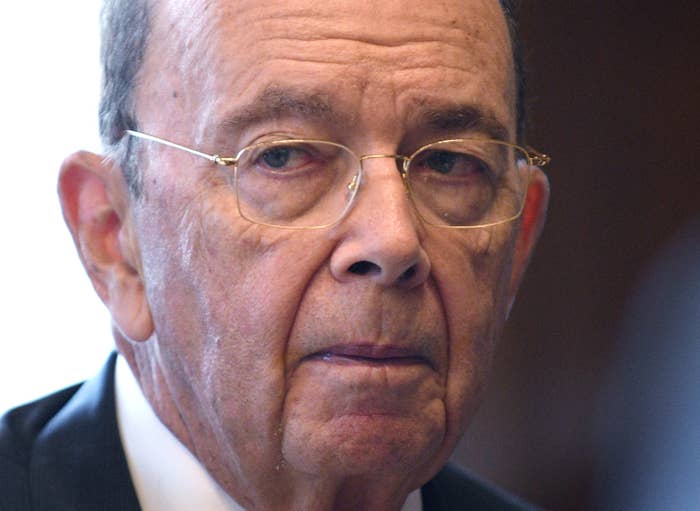
The Supreme Court will hear arguments in February over what evidence should be allowed in a legal challenge to the census citizenship question.
If the Justice Department is successful in its arguments, those challenging agency actions of all stripes could face additional limits on how they can make their cases in the future.
The case out of New York — in which governments and immigrant organizations challenge Commerce Secretary Wilbur Ross's decision to include a question about citizenship in the once-a-decade count — has already been before the justices repeatedly.
The Justice Department first asked the justices to halt depositions that US District Judge Jesse Furman ordered of two officials and stop expanded discovery in the case, but the court only put one of the depositions, that of Ross, on hold.
The department then returned to the justices, asking them to halt a trial that was scheduled to start on Nov. 5. The Supreme Court denied the request.
Ross announced earlier this year that the question would be included in the forms that collect information for the census. The challenges have raised questions about Ross’s motives, the Justice Department’s role in that decision, and whether others — including the White House and outside figures — influenced the move. The addition of the question, which has not been included in the census since 1950, has been opposed not only by immigrant groups and Democrats but also by former directors of the census under presidents of both parties, and the agency’s own scientists.
The trial itself went forward, and it is now — with the exception of Ross's sought testimony and closing arguments — done. Closing arguments are set for Nov. 27, but it was not immediately clear how Friday's Supreme Court order will affect the closing arguments or Furman's resolution of the trial.
The question before the justices in the case accepted on Friday could complicate that. The justices will consider the Justice Department's argument about what evidence should be allowed in the case, a challenge under the Administrative Procedure Act.
Ordinarily, the evidence in such cases is limited to the administrative record prepared by the agency — essentially a collection of documents involving the decision in question, the reasons the agency gave for the decision, and certain related documents. There are exceptions, however, including if the court finds "a strong showing of bad faith or improper behavior" on the part of the decision-maker.
In this case, the district court had ordered additional evidence sought by the challengers outside of the administrative record because it had found a strong showing of bad faith on the part of the Commerce Department. Furman ordered the additional discovery due to questions about Ross's stated reason for including the citizenship question, which was, he said, to assist the Justice Department with meeting its obligations under the Voting Rights Act.
Although Ross's March decision was initially presented as having been generated from a request by the Justice Department, information made public since then showed that the efforts regarding the question's inclusion came first from the Commerce Department itself — which sought the Justice Department's assistance in justifying the question's addition. (The then-head of the Justice Department's Civil Rights Division, John Gore, was the second deposition sought in the case. He had drafted the letter later sent to the Commerce Department. His deposition was not halted by the Supreme Court and took place before the trial began.)
Further information suggested that Ross and the Commerce Department had, in turn, received information about the issue from a White House–prompted discussion between Ross and then-Kansas secretary of state Kris Kobach — a "voter fraud" hardliner who has had his claims rejected in court. Kobach had been in communication with the Commerce Department, per an email made public earlier this year, "on the direction of Steve Bannon" — the former senior strategist to Trump. The Justice Department later acknowledged further entanglement, stating in a court filing in October that Ross "recalls" that Bannon had called him in the early months of the Trump administration and asked if he would be willing to talk with Kobach about the issue.
The Justice Department argued that the Supreme Court should hear the challenge because the additional evidence, including the attempt to depose Ross, amounts to an effort "to probe the mental processes of the agency decisionmaker."
New York and the other states challenging the question's inclusion opposed the Justice Department's request for the Supreme Court to hear the case, arguing that the standards for allowing evidence in administrative action challenges outside of the administrative record are well established and were adhered to by the district court in this case.
The Justice Department counters that "as long as the decisionmaker sincerely believes the stated grounds on which he ultimately bases his decision, and does not irreversibly prejudge the decision or act on a legally forbidden basis, neither initial inclinations nor additional subjective motives constitute bad faith or improper bias" that would allow the court to order that additional evidence be added to the record.
Briefing in the case will take place on an expedited schedule ordered by the court on Friday, with the Justice Department's opening brief due Dec. 17, the challengers' responses due Jan. 17, and the department's reply due Feb. 4. The oral argument in the case is scheduled for Feb. 19.
